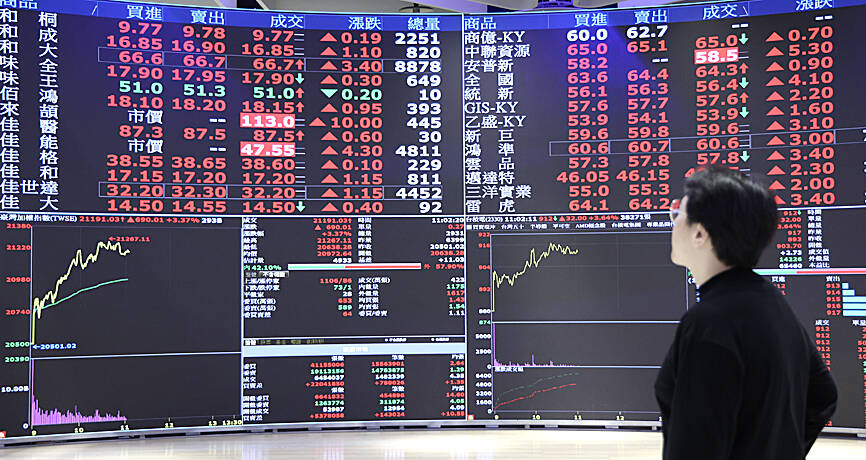Global index provider MSCI Inc yesterday announced that it would trim Taiwan’s weighting in two of its major indices and leave it unchanged in another in keeping with a quarterly index review.
The company said it would leave Taiwan’s weighting intact in the MSCI All Country World Index at 1.98 percent, while cutting Taiwan’s weighting in the MSCI Emerging Markets Index by 0.32 percentage points to 19.1 percent and drop its weighting in the MSCI All-Country Asia ex-Japan Index by 0.18 percentage points to 21.94 percent.
The adjustments would take place at the end of the trading session on Aug. 30 and would inflate the day’s turnover.

Photo: CNA
Stocks are added or removed from an index by analysts within MSCI to ensure that the index still acts as an effective equity benchmark for the market it represents.
The investment company reviews its indices on a quarterly basis in February, May, August and November each year.
MSCI said it would increase the weighting of Taiwan Semiconductor Manufacturing Co (TSMC, 台積電) by 0.2 percentage points to 51.22 percent, as it expects the world’s largest maker of advanced chips would emerge as a major beneficiary of an artificial intelligence boom.
MSCI said it would remove Formosa Petrochemical Corp (台塑石化) from the Taiwanese components.
Analysts said the removal reflected a decline in the share price of Formosa Petrochemical, which was down by almost 21 percent since the beginning of this year as of Monday.
MSCI would add 14 Taiwanese stocks to its MSCI Global Small Cap Indexes, including electronics component maker Chenming Electronic Tech Corp (晟銘電子), IC packaging and testing services provider Elite Advanced Laser Corp (聯鈞光電) and diode product supplier Eris Technology Corp (德微科技), it said.
Among the other Taiwanese stocks to be added are automotive electronics provider G-Shank Enterprise Co (鉅祥企業), Huang Hsiang Construction Corp (皇翔建設), electronic components maker Jess-Link Products Co (佳必琪國際) and building materials supplier Wang Chang General Contractor Co (皇昌營造), it added.
It is to remove convenience store chain operator Taiwan FamilyMart Co (全家便利商店) from the MSCI Global Small Cap Indexes, it said.
The adjustments were scheduled to go into effect after markets close on Aug. 30, it added.
Passive funds linked to the indices totaled US$15 trillion, making their adjustments closely monitored.
Shares in all the 14 stocks that are to join the MSCI small-cap basket picked up yesterday, although the TAIEX shed points for most of the session, but staged a last-minute 0.11-percent rally to 21,796.57, Taiwan Stock Exchange data showed.
Daily turnover tapered to a lackluster NT$342.750 billion (US$10.56 billion).

ADVANCED: Previously, Taiwanese chip companies were restricted from building overseas fabs with technology less than two generations behind domestic factories Taiwan Semiconductor Manufacturing Co (TSMC, 台積電), a major chip supplier to Nvidia Corp, would no longer be restricted from investing in next-generation 2-nanometer chip production in the US, the Ministry of Economic Affairs said yesterday. However, the ministry added that the world’s biggest contract chipmaker would not be making any reckless decisions, given the weight of its up to US$30 billion investment. To safeguard Taiwan’s chip technology advantages, the government has barred local chipmakers from making chips using more advanced technologies at their overseas factories, in China particularly. Chipmakers were previously only allowed to produce chips using less advanced technologies, specifically

BRAVE NEW WORLD: Nvidia believes that AI would fuel a new industrial revolution and would ‘do whatever we can’ to guide US AI policy, CEO Jensen Huang said Nvidia Corp cofounder and chief executive officer Jensen Huang (黃仁勳) on Tuesday said he is ready to meet US president-elect Donald Trump and offer his help to the incoming administration. “I’d be delighted to go see him and congratulate him, and do whatever we can to make this administration succeed,” Huang said in an interview with Bloomberg Television, adding that he has not been invited to visit Trump’s home base at Mar-a-Lago in Florida yet. As head of the world’s most valuable chipmaker, Huang has an opportunity to help steer the administration’s artificial intelligence (AI) policy at a moment of rapid change.

TARIFF SURGE: The strong performance could be attributed to the growing artificial intelligence device market and mass orders ahead of potential US tariffs, analysts said The combined revenue of companies listed on the Taiwan Stock Exchange and the Taipei Exchange for the whole of last year totaled NT$44.66 trillion (US$1.35 trillion), up 12.8 percent year-on-year and hit a record high, data compiled by investment consulting firm CMoney showed on Saturday. The result came after listed firms reported a 23.92 percent annual increase in combined revenue for last month at NT$4.1 trillion, the second-highest for the month of December on record, and posted a 15.63 percent rise in combined revenue for the December quarter at NT$12.25 billion, the highest quarterly figure ever, the data showed. Analysts attributed the

Taiwan Semiconductor Manufacturing Co’s (TSMC, 台積電) quarterly sales topped estimates, reinforcing investor hopes that the torrid pace of artificial intelligence (AI) hardware spending would extend into this year. The go-to chipmaker for Nvidia Corp and Apple Inc reported a 39 percent rise in December-quarter revenue to NT$868.5 billion (US$26.35 billion), based on calculations from monthly disclosures. That compared with an average estimate of NT$854.7 billion. The strong showing from Taiwan’s largest company bolsters expectations that big tech companies from Alphabet Inc to Microsoft Corp would continue to build and upgrade datacenters at a rapid clip to propel AI development. Growth accelerated for